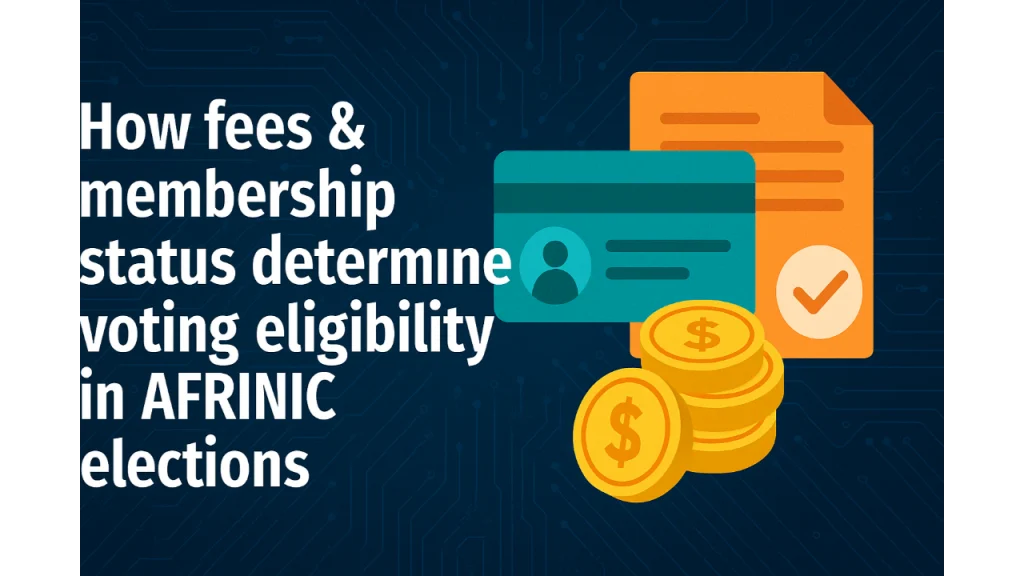- AFRINIC’s fee-linked voting model is under fire for silencing smaller members and entrenching elite control.
- Critics argue the policy weaponises membership status to manipulate elections and suppress reform.
‘Good standing’ rule used to narrow the electorate
AFRINIC’s voting eligibility rules are facing new scrutiny after the registry barred dozens of members from participating in the 2025 board election, citing unpaid fees and lapsed membership. Under AFRINIC’s bylaws, only those “in good standing” — meaning fully paid and administratively verified — may vote or contest for office.
The rule, presented as a matter of financial discipline, has instead become a political weapon. Several members claim they were disqualified for minor or disputed arrears, while others allege they were removed without prior notice. Startups and small Internet Service Providers (ISPs) across Africa say the system unfairly favours well-funded incumbents and large carriers that can easily maintain compliance.
Observers note that AFRINIC’s timing often coincides with election cycles — invoices are issued close to voting periods, giving management broad discretion to determine who qualifies. Critics call this a tactic to limit participation and shape the electorate in favour of allies.
Also read: AFRINIC’s hidden scandal: How legal fees exposed a culture of corruption
Also read: Proxy voting reforms for AFRINIC: What a fair model should look like
How membership criteria distort representation
AFRINIC’s membership structure was designed to reflect regional diversity — giving ISPs, universities, and government agencies equal footing. But in practice, the fee-based eligibility rule excludes many smaller players who cannot meet annual payment deadlines due to exchange-rate issues or administrative delays.
This unequal treatment reinforces a sense that AFRINIC’s leadership prioritises control over inclusivity, turning what should be a technical institution into a political instrument.
Growing doubts about AFRINIC’s legitimacy
The fee-linked voting rule is not the only factor undermining AFRINIC’s legitimacy. It comes on the back of repeated election failures, including the annulled June 2025 poll over a single proxy dispute and the legally contested September rerun. These incidents, coupled with financial opacity, have eroded trust among members and raised questions about AFRINIC’s adherence to global RIR standards.
Under continued court receivership, AFRINIC operates without an elected board. The Receiver’s unilateral enforcement of voting rules — including decisions on member eligibility — has deepened fears of institutional capture. Many in the community now see the registry’s “good standing” requirement as another tool for centralised control, rather than a neutral mechanism for accountability.
The result is a widening gap between AFRINIC’s stated mission of community-led governance and the reality of exclusionary practices. Each new election dispute adds to the perception that the registry no longer functions as a legitimate representative body for Africa’s internet ecosystem.
Also read: AFRINIC launches voter onboarding ahead of board election
Calls for external intervention
Major members, including Cloud Innovation, have called for a full review of AFRINIC’s structure under the ICP-2 framework, urging ICANN and the Number Resource Organization (NRO) to consider appointing a new Regional Internet Registry if the current one continues to fail. Cloud Innovation argues that fee-based disenfranchisement contradicts the cooperative principles on which RIRs operate.
Community advocates have proposed reforms such as:
- Decoupling voting rights from payment status.
- Transparent publication of all suspended memberships and arrears disputes.
- Independent audits of fee enforcement decisions.
Until such reforms are made, AFRINIC’s authority will remain in doubt. What began as a financial rule has become a symbol of how power, not policy, drives Africa’s internet governance. The longer this continues, the greater the risk that AFRINIC’s dysfunction will isolate Africa from the global internet governance framework it was built to serve.

